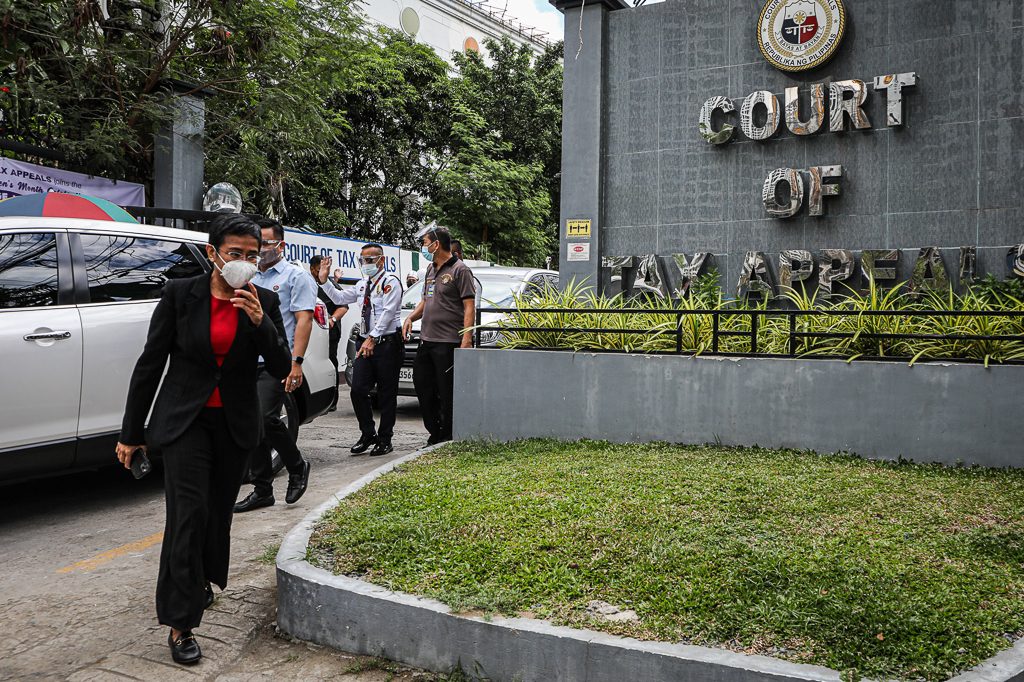SUMMARY
This is AI generated summarization, which may have errors. For context, always refer to the full article.

MANILA, Philippines – When former president Rodrigo Duterte launched his attacks on media, his government used Philippine Depositary Receipts (PDRs) as a tool to paint news companies like Rappler and ABS-CBN as tax evaders and foreign owned, creating in the process a chilling effect that crossed over to the business sector.
In acquitting Rappler and its CEO, Nobel laureate Maria Ressa, the Philippines’ Court of Tax Appeals explained how local laws and regulations innovated to allow businesses to raise capital. One is the use of a holding company, like Rappler Holdings, which issued the PDRs to foreign investors, and the other is PDR.
“It is not repugnant to the nature of a holding company to engage in financial activities to raise capital for its subsidiaries,” said the tax court, adding that the concept of a holding company is really to “raise large capital for subsidiaries that have limited access to financing or are restricted to do so by regulatory agencies for various other reasons.”
The Constitution requires media companies to be 100% Filipino owned. PDR was a tool to get large capital from a foreign investor without violating this rule.
PDR was a common tool not only for media companies but other large companies as well, said Francis Lim, Rappler’s lead counsel in the PDR and tax cases, and former president of the Philippine Stock Exchange (PSE) and the Management Association of the Philippines.
“It’s very common. In fact, under my watch [at the PSE], GMA Holdings listed its PDRs of GMA, the TV network. PLDT, Globe Telecom, many…some of them even listed their PDRs in the New York Stock Exchange,” said Lim.
ABS-CBN also has PDRs, which were used by legislators allied with Duterte to take away the franchise of the largest TV network and keep them off the air for the first time since the Marcos dictatorship.

By “weaponizing” PDRs, said Lim, investors were spooked, impacting the business sector.
“I know for a fact there was a [negative] effect. It’s a very bad precedent for business. If I was the business owner and I think that if I do something that will anger the future administration, my business will be shut down, imagine the chilling effect on that,” Lim said in a mix of English and Filipino.
“Cases like the one against ABS-CBN would make them a less attractive investment instrument, especially other nationalized companies like telecommunications,” he said.
And if these companies have no investment, then they cannot render service, and most importantly, they cannot provide jobs.
Defining PDRs
To prosecute Rappler, the BIR said that when the holding company issued a PDR, it acquired taxable income and therefore must pay income tax and value added tax.
The CTA said that there was no taxable income gained in such event because PDRs are defined in Philippine regulation as having “no right of ownership over the underlying shares.”
What PDR gave to foreign investors was the right to buy an underlying share compliant to laws. But because media companies should be 100% Filipino owned, Rappler’s PDR holders cannot buy any underlying share. They can only benefit from the shares of the dividend of the subsidiary.
“There is nothing in the wordings of the PDR instruments and the PDR subscription agreements that would show the foreign entities Omidyar and North Base Media will become owners of the shares of stock of Rappler Inc. upon the issuance of the PDRs,” said the CTA, concluding that there was no taxable income if there was no sale in the first place.
Lim said the foreign investors could also sell the PDR in the future to a Filipino investor, who would then be able to exercise the right to buy shares.
Check and balance
“I’ve been in practice since 1981, and this is the first time I’ve seen a case like this where cases started to be filed against a company that was mentioned by no less than the President in his State of the Nation Address,” said Lim, who has had to navigate a case of his specialization but in the backdrop of free speech.
What happened to Rappler, ABS-CBN, and even Philippine Daily Inquirer, which Duterte attacked on the basis of its other subsidiaries, are part of a global trend of autocratic leaders attacking the press using confusing laws such as tax and corporate.
While in other countries, their congresses or parliaments are more powerful, Lim said it was crucial that the Philippines’ constitutional setup put the executive, legislative, and judiciary in co-equal status.
“That’s the reason why we have a check and balance, because if the executive branch is abusing as what happened in this case, then the judiciary can check the abuses,” said Lim.
“This is also where press freedom comes in because without an independent press, without a courageous press, abuses such as this will not be publicized, and if it’s kept under wraps, abuses will continue,” said Lim. – Rappler.com
Add a comment
How does this make you feel?








![[OPINION] De-weaponizing tax laws: Upholding press freedom and economic growth](https://www.rappler.com/tachyon/2023/10/tl-upholding-press-freedom-economic-growth.jpg?resize=257%2C257&crop_strategy=attention)
There are no comments yet. Add your comment to start the conversation.